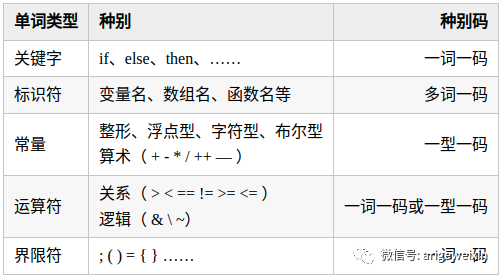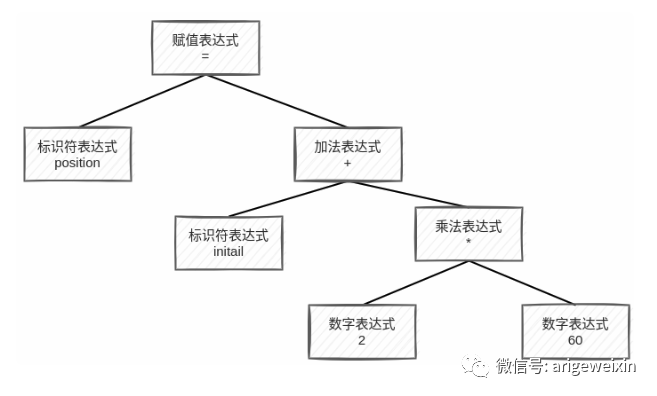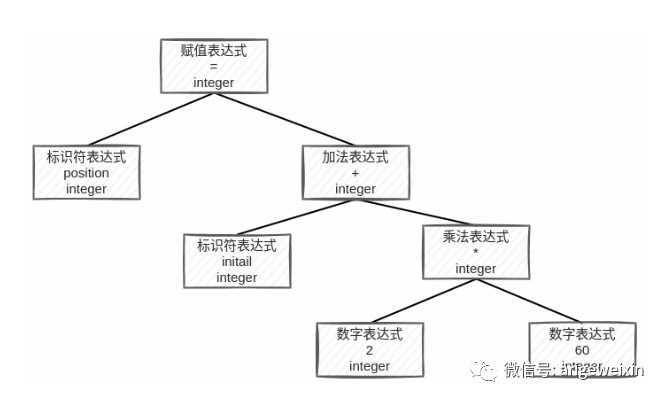一、背景
有一个需求,需要将源码提供出去,交予三方进行安全审核,为了减少代码泄漏带来的影响,要求将
- 自己的源码中要有代码注释
- 对外提供的代码中,将所有的代码注释移除,增加其他人的代码阅读难度
二、艰难的爬坑过程
1、整理java中的注释情形
多行注释:2、初步入坑
对上一步的情况分析后简单的结论,
- 以 /* 开头,以*/结尾
- 以 //开头,以换行或者文件结束 结尾
3、核心代码
re.findall("\/\*.*?\*\/", content, re.S)- 按行遍历文件,检查是否包含 “//”,如果包含就将 “//”及以后的内容替换为换行
re.findall("\/\/.*", line, re.S)4、进入大坑
本以为这样是一个简单粗暴的方法,真正跑起来之后发现有较大问题
- 字符串中包含 多行和单行 注释的话,就会导致字符串内的内容被修改
// 后面有一个单独的 “ ,引号的排查优先级高,导致这个引号被保留,导致整体移除异常
"select * from user where name = 'root'"
- 中间的引号不能作为字符串的开始和结尾
- 最后的双引号需要算做字符串的结尾
- 这样的不能当作双引号,也就是这样的不能作为字符串的开始和结尾
三、回头是岸
有时候捷径不是最快的路径。
折腾了几天之后发现按照穷举法去发现所有的异常case实在是太难了,因为我们的精力是有限的,一时半会无法想到所有的case,那有没有什么办法呢?
这个时候记忆深处的一些内容开始冒泡泡,程序员的三大浪漫之一的 编译原理 开始出现了。
之前懵懵懂懂读过的文本开始有一点点印象了。重新翻开经典之作的内容,看看他是怎么来处理词法和语法的。
1、回顾编译原理
- 词法分析,程序中的单词大体可以分成五类:

- 语法分析,比如,对于赋值语句
position = initial + 2 * 60,经过语法分析后生成的树

- 语义分析,比如
position = initial + 2 * 60 经过语义分析后

2、着手处理
按照编译原理中讲的过程,要先一个的拆成词,然后将词串成语句,然后一个语句一个语句的处理。
整体的思路:
- 判断是否已经在不用关注的范围内,例如在 双引号中间的,在多行注释中的,在单行注释后面的
- 如果已经开始了,就只用关注是否是双引号、多行注释、单行注释的结尾
- 如果是结尾,就分别处理,
- 在双引号、多行注释、单行注释开始的时候,把前一次的给保存到新文件中
3、代码
# coding=utf-8
foler_path = "./java/test/"
def rewriteContent(dirpath, filename, content):
writefile = open(dirpath + "/" + filename, "w+")
# print content
writefile.write(content)
writefile.close()
def clean_all_note():
for dirpath, dirnanes, filenams in os.walk(foler_path):
for filename in filenams:
print dirpath + "/" + filename
clean_note(dirpath, filename)
#判断是否是双引号,需要排除 '"' 和 \" 的情况,
def is_available_quotes(ch, pre_ch,next_ch):
return ch == "\"" and pre_ch != "\\" and not (pre_ch == "'" and next_ch == "'")
#判断是否是多行注释的开头 即 /*
def is_prefix_multiline_comment(ch, pre_ch):
return ch == "*" and pre_ch == "/"
#判断是否是多行注释的结尾,即 */
def is_suffix_multiline_comment(ch, pre_ch):
return ch == "/" and pre_ch == "*"
#判断是否是单行注释 //
def is_single_line_comment(ch, pre_ch):
return ch == "/" and pre_ch == "/"
# 判断是否是换行
def is_line_feed(ch, pre_ch):
return ch == "\n"
def clean_note(dirpath, filename):
file = open(dirpath + "/" + filename, "r+")
content = file.read()
multiline_ing = False
single_line_ing = False
quotes_ing = False
pre_ch = ""
index = 0
lastPoi = 0
newContent = ""
for ch in content:
if multiline_ing:
if is_suffix_multiline_comment(ch,pre_ch):
# print "m l e:" + pre_ch + ch
lastPoi = index+1
multiline_ing = False
elif single_line_ing:
if is_line_feed(ch,pre_ch) or index == len(content)-1:
# print "s l e:" + content[lastPoi:index-1]
lastPoi = index
single_line_ing = False
elif quotes_ing:
#解决 "\\"
if ch == "\\" and pre_ch == "\\":
ch = ''
if is_available_quotes(ch, pre_ch,content[index+1]):
# print "yinhao e :" + pre_ch + ch
newContent = newContent + content[lastPoi:index]
lastPoi = index
quotes_ing = False
else:
if index == len(content)-1:
# print "e s :" + pre_ch + ch
newContent = newContent + content[lastPoi:index+1]
elif is_available_quotes(ch, pre_ch,content[index+1]):
# print "yinhao s :" + pre_ch + ch
# newContent = newContent + content[lastPoi:index]+"----"
quotes_ing = True
elif is_prefix_multiline_comment(ch, pre_ch):
# print "m l s :" + pre_ch + ch
newContent = newContent + content[lastPoi:index-1]
multiline_ing = True
elif is_single_line_comment(ch, pre_ch):
# print "s l s :" + pre_ch + ch
newContent = newContent + content[lastPoi:index-1]
single_line_ing = True
index = index+1
pre_ch = ch
rewriteContent(dirpath, filename, newContent)
if __name__ == '__main__':
for dirpath, dirnanes, filenams in os.walk(foler_path):
for filename in filenams:
clean_note(dirpath, filename)





































